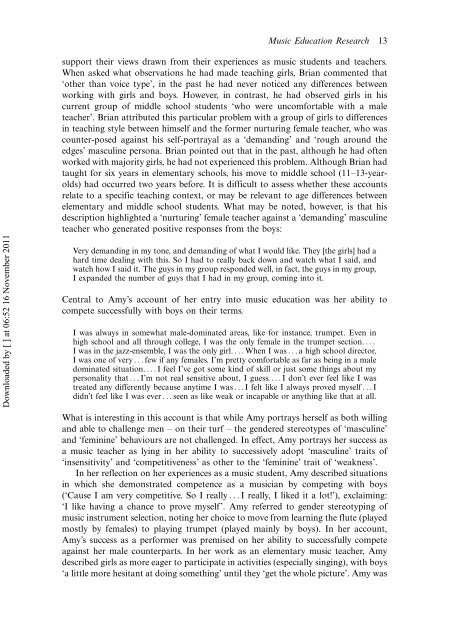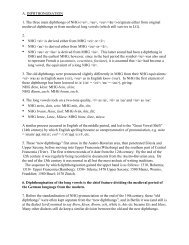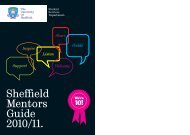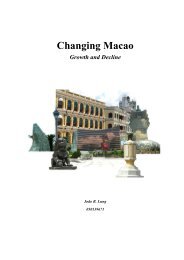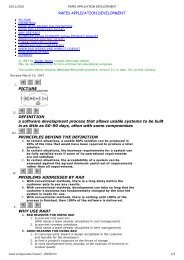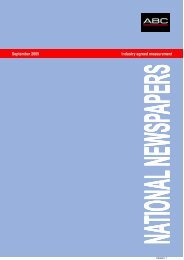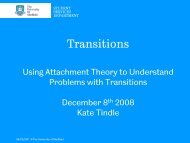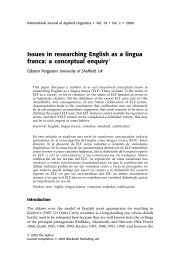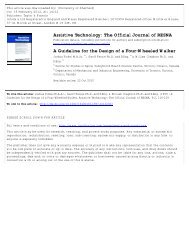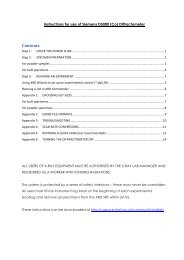Music teachers' constructions of gender in elementary education
Music teachers' constructions of gender in elementary education
Music teachers' constructions of gender in elementary education
Create successful ePaper yourself
Turn your PDF publications into a flip-book with our unique Google optimized e-Paper software.
Downloaded by [ ] at 06:52 16 November 2011<br />
<strong>Music</strong> Education Research 13<br />
support their views drawn from their experiences as music students and teachers.<br />
When asked what observations he had made teach<strong>in</strong>g girls, Brian commented that<br />
‘other than voice type’, <strong>in</strong> the past he had never noticed any differences between<br />
work<strong>in</strong>g with girls and boys. However, <strong>in</strong> contrast, he had observed girls <strong>in</strong> his<br />
current group <strong>of</strong> middle school students ‘who were uncomfortable with a male<br />
teacher’. Brian attributed this particular problem with a group <strong>of</strong> girls to differences<br />
<strong>in</strong> teach<strong>in</strong>g style between himself and the former nurtur<strong>in</strong>g female teacher, who was<br />
counter-posed aga<strong>in</strong>st his self-portrayal as a ‘demand<strong>in</strong>g’ and ‘rough around the<br />
edges’ mascul<strong>in</strong>e persona. Brian po<strong>in</strong>ted out that <strong>in</strong> the past, although he had <strong>of</strong>ten<br />
worked with majority girls, he had not experienced this problem. Although Brian had<br />
taught for six years <strong>in</strong> <strong>elementary</strong> schools, his move to middle school (11 13-yearolds)<br />
had occurred two years before. It is difficult to assess whether these accounts<br />
relate to a specific teach<strong>in</strong>g context, or may be relevant to age differences between<br />
<strong>elementary</strong> and middle school students. What may be noted, however, is that his<br />
description highlighted a ‘nurtur<strong>in</strong>g’ female teacher aga<strong>in</strong>st a ‘demand<strong>in</strong>g’ mascul<strong>in</strong>e<br />
teacher who generated positive responses from the boys:<br />
Very demand<strong>in</strong>g <strong>in</strong> my tone, and demand<strong>in</strong>g <strong>of</strong> what I would like. They [the girls] had a<br />
hard time deal<strong>in</strong>g with this. So I had to really back down and watch what I said, and<br />
watch how I said it. The guys <strong>in</strong> my group responded well, <strong>in</strong> fact, the guys <strong>in</strong> my group,<br />
I expanded the number <strong>of</strong> guys that I had <strong>in</strong> my group, com<strong>in</strong>g <strong>in</strong>to it.<br />
Central to Amy’s account <strong>of</strong> her entry <strong>in</strong>to music <strong>education</strong> was her ability to<br />
compete successfully with boys on their terms.<br />
I was always <strong>in</strong> somewhat male-dom<strong>in</strong>ated areas, like for <strong>in</strong>stance, trumpet. Even <strong>in</strong><br />
high school and all through college, I was the only female <strong>in</strong> the trumpet section. ...<br />
I was <strong>in</strong> the jazz-ensemble, I was the only girl. ...When I was ...a high school director,<br />
I was one <strong>of</strong> very ...few if any females. I’m pretty comfortable as far as be<strong>in</strong>g <strong>in</strong> a male<br />
dom<strong>in</strong>ated situation. ...I feel I’ve got some k<strong>in</strong>d <strong>of</strong> skill or just some th<strong>in</strong>gs about my<br />
personality that ...I’m not real sensitive about, I guess. ...I don’t ever feel like I was<br />
treated any differently because anytime I was ...I felt like I always proved myself ...I<br />
didn’t feel like I was ever ...seen as like weak or <strong>in</strong>capable or anyth<strong>in</strong>g like that at all.<br />
What is <strong>in</strong>terest<strong>in</strong>g <strong>in</strong> this account is that while Amy portrays herself as both will<strong>in</strong>g<br />
and able to challenge men on their turf the <strong>gender</strong>ed stereotypes <strong>of</strong> ‘mascul<strong>in</strong>e’<br />
and ‘fem<strong>in</strong><strong>in</strong>e’ behaviours are not challenged. In effect, Amy portrays her success as<br />
a music teacher as ly<strong>in</strong>g <strong>in</strong> her ability to successively adopt ‘mascul<strong>in</strong>e’ traits <strong>of</strong><br />
‘<strong>in</strong>sensitivity’ and ‘competitiveness’ as other to the ‘fem<strong>in</strong><strong>in</strong>e’ trait <strong>of</strong> ‘weakness’.<br />
In her reflection on her experiences as a music student, Amy described situations<br />
<strong>in</strong> which she demonstrated competence as a musician by compet<strong>in</strong>g with boys<br />
(‘Cause I am very competitive. So I really ...I really, I liked it a lot!’), exclaim<strong>in</strong>g:<br />
‘I like hav<strong>in</strong>g a chance to prove myself’. Amy referred to <strong>gender</strong> stereotyp<strong>in</strong>g <strong>of</strong><br />
music <strong>in</strong>strument selection, not<strong>in</strong>g her choice to move from learn<strong>in</strong>g the flute (played<br />
mostly by females) to play<strong>in</strong>g trumpet (played ma<strong>in</strong>ly by boys). In her account,<br />
Amy’s success as a performer was premised on her ability to successfully compete<br />
aga<strong>in</strong>st her male counterparts. In her work as an <strong>elementary</strong> music teacher, Amy<br />
described girls as more eager to participate <strong>in</strong> activities (especially s<strong>in</strong>g<strong>in</strong>g), with boys<br />
‘a little more hesitant at do<strong>in</strong>g someth<strong>in</strong>g’ until they ‘get the whole picture’.Amywas


